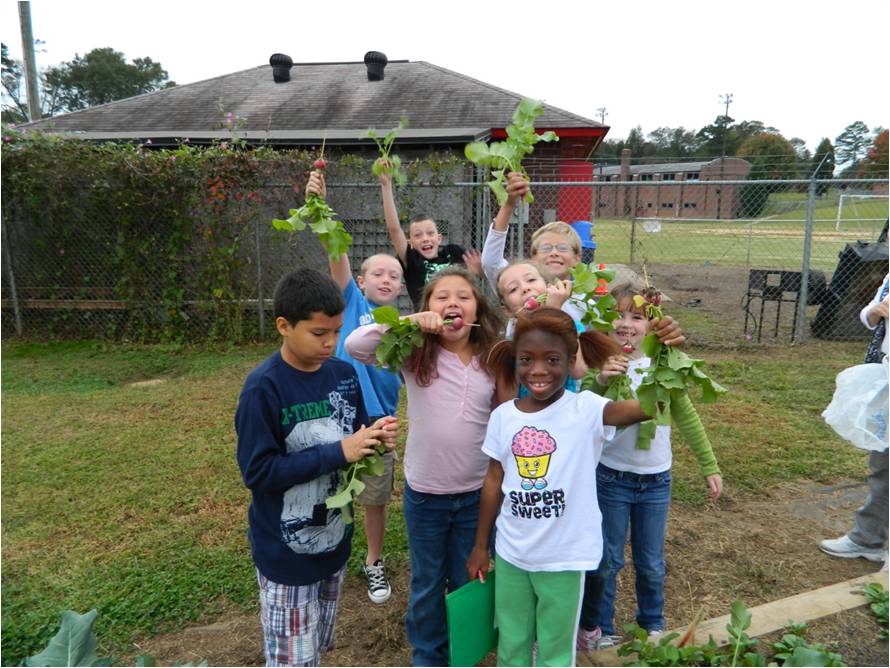Farm to School is broadly defined as any program that connects schools and local farms with the objective of serving healthy meals in school cafeterias, improving student nutrition, educating students about health and wellness, and supporting local and regional farmers.
Why is this important to your community?
Demand for local foods is growing across all markets, from consumers to the largest regional grocery chains. Farm to School programs support local farms and healthy lifestyle choices for children by incorporating fresh food direct from farmers into school lunches. Farm to School programs are useful in providing hands-on education for students that teaches them about the benefits of healthy eating and how food is produced. Additionally, the larger community benefits from farm to school programs. Purchasing from local farmers reduces the environmental impact of shipping food and stimulates the local economy. Increasing fresh food consumption can reduce childhood obesity rates and promote healthy eating for life. Farm to School programs may also help to engage the next generation of local farmers!
Farm to School programs offers students an opportunity to participate in planting and harvesting activities, to learn to cook with seasonal ingredients, to learn about the cycles of agriculture and the seasonality of crops, to meet farmers growing food in their communities, and to try new fruits and vegetables. These types of positive experiences influence the formation of food preferences and eating habits and, in the long term, create healthier individuals and communities.
Where is it appropriate to use?
What priorities does it address?
What other tools are related?
- Active Living
How does it work?
Programs can vary from large-scale state-supported programs to school produce gardens, some examples include farm field trips, cooking demonstrations with seasonal ingredients, local food tastings, meet the farmer events, school gardens, and other hands-on activities within the schools that encourage children to positively engage with food and agriculture. Many states throughout the country have farm to school programs that focus on providing participating schools with produce sourced from farms within their state. Individualized programs in school districts or single schools often involve produce sourced from farms within the immediate vicinity of the school. When paired with school curricula and gardening activities, Farm to School programs have the added impact of educating students about the larger food system and healthy life choices.
Ready to get started?
Using the Tool
- Understand how your local school’s food delivery system works - what is the budget for providing lunches, who holds the existing contract for providing food, and who is in charge of purchasing for the school/school district.
- Convene a working group of school representatives, local farmers, nutritionists, and other partners to discuss alternative options for incorporating local produce into education and school lunches. Be sure that you are aware of local health regulations regarding food served in lunchrooms, as they play a factor in what can be served and how it must be handled.
- Begin by determining the components of your Farm to School program and decide how best your school can participate. Is it a school garden coupled with education, participation in a state Farm to School program (NC Farm to School Program), or working with local farmers to supply produce for school lunches? You may be able to obtain funding from state legislatures or non-profit organizations for pilot programs at your school.
- Additional considerations may include:
- Compare what local farmers are currently producing to what is needed for school lunches. This may require coordination with the school board or USDA to determine nutrition standards for school lunches.
- Determine what supportive education and health programs may enhance your Farm to School program. This could include involving teachers from a variety of disciplines to work with students on areas of nutrition, physical education, and science. Look at sample lesson plans to get ideas.
- Research what programs have been successful in the region. Are there farmers already working with other local schools, and is there a desire or need for a wellness-based curriculum? Or could this be linked to an exploration of potential careers?
- Consider attending or offering a local workshop or presentation about Farm to School programs. Organizations like Growing Minds can help educate parents and school officials about these programs and provide links to helpful resources.
- Ensure that parents, teachers, and students understand the benefits of Farm to School programs. Farm tours, local food tastings, or pamphlets could be used to enhance parent, teacher, and student knowledge of wellness-based programs.
Partners
- Advocacy Groups
- Colleges and Universities
- Departments of Education / School Districts
- Elected Officials
- Faith-Based Organizations
- Farmers / Agricultural Extension Office
Where has it worked?
Gaston County Schools - Gaston County, NC
About the Program
Under the Gaston County Cooperative Extension, schools are participating “farm to table” programs that connect students to local agriculture. Harvesting Healthy Youth is a 15-week school gardening and nutrition program offered to 3rd grade classrooms under the direction of FoodCorps volunteers. In 2013, the program reached 950 3rd grade students at twelve elementary schools in the county. As part of the FoodCorps volunteer efforts, Gaston County schools have also started the Harvest of the Month program where local produce is featured in school lunches every month.
Why it works
The program successfully incorporates local produce into schools and helps students create positive experiences with fresh food in an effort to encourage healthy eating habits and reduce rates of childhood obesity. Harvesting Healthy Youth incorporates hands-on gardening and nutrition education where students not only learn about how food is produced, but also use the experience to meet learning objectives in other subjects. The program is funded by FoodCorps, a national program designed to address childhood obesity, which places young, motivated leaders in low-resource communities where they receive stipends in exchange for teaching students about gardening and healthy eating habits and work to establish Farm to School programs. FoodCorps volunteers helped to create the Harvest of the Month program which gives students the opportunity to sample seasonal produce by featuring a locally sourced fruit or vegetable in the cafeteria every month. The hope is that students will begin making healthier choices at school and home. Before 2011, schools in Gaston County had never served produce from local farms. While most schools were participating in Farm to School programs, the produce was sourced from larger farms throughout the state, not directly from local farmers. Now students at Gaston County schools are equipped with the knowledge of where their food comes from, how to grow and care for a garden, and what foods are healthy, while local farmers now have an opportunity to sell fresh food directly to the county schools.
http://www.charlottemagazine.com/Charlotte-Magazine/December-2012/Growing-Up-Green/
- Colleges and Universities



